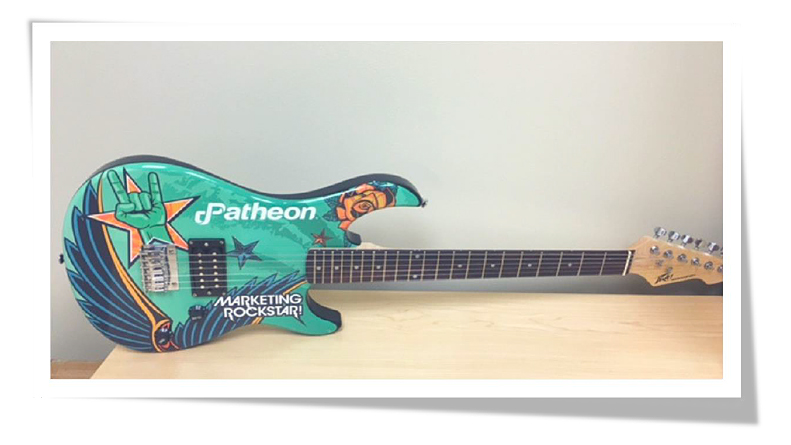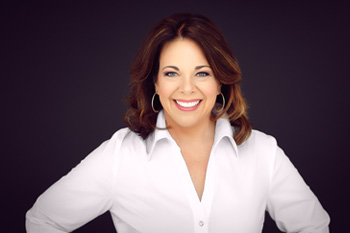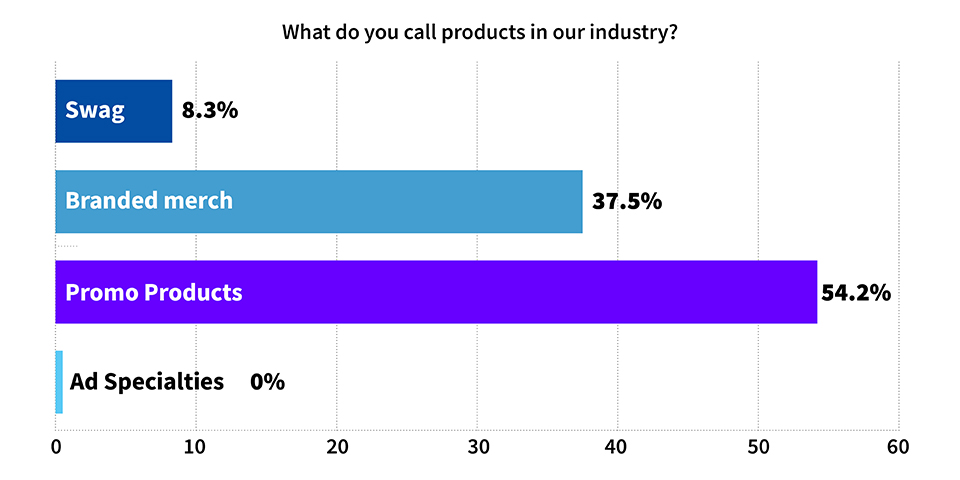We love the promo industry. But we know it can be better.
How? In this series of stories, ASI Media explores five big ideas that can transform the world of promo. These aren’t quick fixes or simple changes. But with enough consideration, ambition and coordination, we think they’re all possible. And our beloved industry – and the people who live and breathe it – will be better off for it.
There’s an unfortunate irony to it.
The promotional products industry is full of branding experts. And yet, the market has a branding problem.
Like it or not, there persists a perception that all promo does is crank out “freebies,” “cheap junk” and “tchotchkes.” A belief that “swag” may be nice to have, but that it delivers little value.
5 Ideas to Improve Promo
1. How to Change Our ‘Brandfill’ Image Problem
2. Can the Promo Industry Go Plastic Free?
3. The Path to Getting Out of China
4. Use These Ideas From the World’s Biggest Companies to Improve Diversity
5. The Blueprint to Improving Promo’s Convoluted Order Process
While there’s a wealth of evidence that proves otherwise, in the popular conscience there remains a general bias that promo is disposable, schlocky and wasteful – the black sheep of the advertising world.
Such antipathetic assessments, despite strong replies from promo leaders, reinforce entrenched prejudices against the industry. And that leads to more than an image problem for promotional products; it creates a bottom-line issue.
The disparaging perception of branded merchandise is part of what compels some companies – like Google, Netflix and others – to stop investing in promo products when tougher economic times set in. It’s not only provided tinder for media hit pieces, but it’s also given rise to a burgeoning “anti-swag” movement that calls for the end of giveaways.
All of which raises a simple but daunting question: How can the industry collectively improve its image?
Provide Solutions, Not Just ‘Stuff’
Initially, the client thought it wanted straightforward awards to recognize standouts in its marketing department. Brand Fuel (asi/145025) delivered much more: A solution that would blossom into the company’s Marketing Rockstar Recognition Program.

Brand Fuel developed this award for marketing standouts at client Patheon.
It all started with gentle pushback from the Raleigh, NC-headquartered distributorship. The pharmaceutical industry company requested what Brand Fuel described as “old school” awards. “We suggested marketing professionals likely would prefer something creative, utilitarian and fun,” says company co-President Danny Rosin. “Something that would really make them feel recognized.”
The client, Patheon, was game to try. What Brand Fuel came up with was a customized guitar that featured the company’s logo, the words “marketing rockstar,” and rock ’n‘ roll-themed imagery. “This was a huge hit, and it birthed a new recognition program,” Rosin explains.
“We should be providing recommendations for merchandise end-users will love and want to use. We need to function more like agencies.” Jo Gilley, Overture Promotions
The case study brings to life advice that about a dozen distributor leaders gave in speaking with ASI Media for this article. And that’s this: Promo can collectively improve its effectiveness as a medium – and consequently the esteem in which it’s held – if distributor sales professionals constantly operate as expert marketing consultants, providing clients with creative merchandise that generates desired ROI, rather than just taking an order and scouring suppliers for the lowest price.
“Thoughtlessly putting a logo on the cheapest pen is what drags down our collective reputation,” says Jo Gilley, CEO of Top 40 distributor Overture Promotions (asi/288473) and a member of Counselor’s Power 50 list of promo’s most influential people. “We should be providing recommendations for merchandise that end-users will love and want to use. We need to function more like agencies, guiding clients to best practices and products for brand activation and building brand equity.”
If distributors of all sizes began taking this agency-style consultatory approach, there’s belief that there would be a kind of organic groundswell of improvement in the industry’s aggregate reputation. Why? Because end-buyers would be getting better results for their marketing dollar across the board, and would thus see greater value in branded merch, the reasoning goes. Relatedly, there would be less likelihood of promo getting the ax when purse-tightening comes into play.
“Quality distributors design solutions that drive impactful messaging and experiences,” says Nancy Schmidt, CEO of Top 40 distributor AIA Corporation (asi/109480) and a Power 50 member. “We can add value by presenting product solutions that allow customers to contribute to the reduction of ‘useless swag’ by opting for higher-quality, useful branded merchandise that’s a true extension of their brands and that impresses their end-users.”
Make Sustainability & Social Responsibility
Central to Your Business
At Harper + Scott (asi/220052), morals matter.
The New York City-headquartered distributorship doesn’t just want to sell a lot of product. It aims to build winning merch campaigns that get clients results, while operating in a way that’s responsible toward the planet and the people that directly work for the firm and that are part of its supply chain.
Harper + Scott is proving that it conducts business in this manner by becoming a B Corp, a hard-to-earn certification that a company is meeting high ethical standards of verified performance, accountability and transparency on factors that include employee benefits, charitable giving, supply chain practices and input materials.
“When your entire company is based around doing better for our environment and society, it will naturally reflect on your clients as well, making you a more attractive partner,” says Jon Alagem, president of Harper + Scott.
Theresa Hegel, executive editor of digital content at ASI Media, speaks with Kathy Cheng, founder and president of Redwood Classics Apparel (asi/81627), about how to create a sustainable business model that focuses on people, planet and profit.
Harper + Scott is part of an impressive – and expanding – movement among suppliers and distributors to operate more sustainably and with greater social responsibility. It’s a phenomenon that ASI Media has been documenting through its Promo for the Planet initiative – one that shows you can be, as ASI President and CEO Tim Andrews recently wrote, both pro-promo and pro-planet.
Companies at the head of this charge say the momentum must continue to grow within promo, becoming much more widespread. Relatedly, it’s pivotal to document and prove you’re putting into play practices that meet high standards on both sustainability and positive impact on people and the community – and then share that information everywhere from your website and social media platforms, to various marketing channels and direct interactions with clients.
The more businesses in the space that operate in a truly responsible way, the better promo will actually be, and the perception of the industry will improve, advocates of this approach say.
“When your entire company is based around doing better for our environment and society, it will naturally reflect on your clients as well, making you a more attractive partner.” Jon Alagem, Harper + Scott
Already many businesses are doing this. Like Harper + Scott, a lengthening list of firms have earned B Corp status, including Brand Fuel, EcoPlum (asi/185835), Full Line Specialties (asi/199688), and McCabe Promotional Advertising Inc. (asi/264901).
Meanwhile, some of the biggest promo suppliers have implemented robust sustainability/CSR programs, including SanMar’s (asi/84863) Canvas for Good, Koozie Group’s (asi/40480) “Keep it. Give it.” program, Gildan’s ongoing environmental, social and governance efforts and Polyconcept North America’s (PCNA, asi/78897) Proud Path platform. The list could be much longer. Specific efforts from suppliers include initiatives like increasing recycling, reducing emissions, and taking tangible steps to minimize earth impacts, such as Top 40 supplier Gemline (asi/56070) just earning chain-of-custody certification from the Forest Stewardship Council.
There are also industry-wide innovations underway, like SwagCycle, which allows brands and other promo companies to recycle or repurpose unwanted promo products through recycling or donation to charitable organizations.
If promo wants to remain relevant in the years ahead, these and other eco and socially conscious efforts must proliferate.
“Consumers want their purchases associated with purpose-driven companies that are investing back in their communities and taking care of the environment,” says Meg Erber, an educator with Top 40 supplier S&S Activewear (asi/84358) who was speaking in her capacity as a board member for PromoCares, an industry volunteer group that works to encourage social and environmental responsibility in the merch market.
Make & Sell Higher Quality Products
Bob Lilly sees it as a shared responsibility.
The president/CEO of Dallas-area distributorship Bob Lilly Promotions (asi/254138) believes suppliers should intensify efforts to make products that are higher quality and long-lasting. For items with a shorter shelf life, the focus should be on using biodegradable materials and materials which have been or can be recycled, he says.
Still, as Lilly articulates, that’s only half the battle. It’s then up to distributors to steer end-clients to these items. “We’re problem-solving consultants,” Lilly states. “It’s incumbent on us to be thought-leaders and drivers of solutions which are good for our clients, their brands and our planet.”
Lilly’s views are mirrored in the minds of many promo leaders. They believe making and selling products of greater quality, while at the same time moving away from pushing single-use and lower-end items, can simultaneously bolster positive results for end-clients and enhance promo’s standing. It will take collaboration through promo’s value chain – from suppliers manufacturing the requisite goods, to distributors selling them – but it’s possible to execute this evolution.
“We’re problem-solving consultants. It’s incumbent on us to be thought-leaders and drivers of solutions which are good for our clients, their brands and our planet.” Bob Lilly, Bob Lilly Promotions
“Suppliers need to increase the quality of products and the quality of print, and help distributors come up with up with better ideas to share with customers,” says Ryan Schraffenberger, president of Marathon, FL-based distributorship Promotions Guy (asi/301030). “Distributors need to then educate consumers and end-users on the importance of quality products. If distributors focus on selling quality products, then suppliers will no longer have to make throwaway items.”
Adds Lilly: “Distributor sales professionals need to be educated on sustainability and recycled products, as well as what products cost to make. Not just the price, but how much clean water, how much plastic and other raw materials go into a product. I believe that if our industry sales professionals were better educated on these facts, they could make a more informed selling decision.”
Advocates also opine that suppliers should attach charitable giveback components to products and lines – and/or otherwise have giving back built directly into their business models. This ups the value proposition to end-users, making the suppliers’ collections more sellable, and helps deepen the narrative that promo is an industry that can be a force for good.
“PromoCares recommends that distributors choose to work with suppliers that align with their values, use a corporate social responsibility model and have a give-back component,” Erber says.
The movement toward greater sustainability & corporate social responsibility in the #promoproducts industry is growing. Supplier Fill it Forward’s business model exemplifies that. Allan Babor explains at #ASIChicago @fillitforward @EliezaB_ASI @asicentral pic.twitter.com/MyJQ06haOn
— Chris Ruvo (@ChrisR_ASI) July 22, 2022
For sure, the movement toward higher-quality products, more sustainably made products, and altruism-in-business-action must grow, but it’s already underway in promo. Examples abound.
For instance: Every reusable water bottle that Fill it Forward (asi/54161) makes contains a QR code. When an individual scans the code to signify they’re using the bottle, Fill it Forward contributes to one of its do-gooding charitable partners, such as charity: water, a nonprofit that brings clean and safe drinking water to people in developing countries.
Meanwhile, SanMar has debuted a carbon neutral apparel line and has pledged to make drastic reductions in emissions by 2030. A portion of the proceeds of every sale from Sweda’s Basecamp line is donated to Wounded Warrior Project. Initiatives from Maple Ridge Farms (asi/68680) and Top 40 firm Charles River Apparel (asi/44620) have wed sales to charitable support.
There’s also the fact that suppliers are partnering with more retail brands than ever before, bringing these higher-end items to the promo space. Top 40 supplier PCNA’s partnership with drinkware brand Hydro Flask is just one of many high-profile examples in the past couple years.
“Distributors need to stop offering single-use and low-end items that anyone can get anywhere and start focusing more on items that last and are unique and meaningful,” says Allmade (asi/34341) founder Ryan Moor, a Power 50 member whose company’s top-selling T-shirts are produced from 50% recycled polyester, 25% organic cotton and 25% Tencel modal, which comes from beech tree pulp.
Present With Lifestyle & Function in Mind
As Sarah Whitaker sees it, promo could enhance how it’s perceived if the industry started presenting ideas to clients differently.
Rather than showcase “floating product imagery” that displays items in bland stand-alone isolation, or simply describing a product’s attributes, industry companies should populate social media feeds, printed marketing materials and client presentations with graphics and narratives that spotlight how products are actually used in life, says the owner of Hopkinsville, KY-based distributor Williams Advertising (asi/360402).
An example of preferred marketing imagery might be a couple hiking in a lush forest, pausing to admire a beautiful view as they sip from their branded stainless-steel tumblers. There’s more persuasive emotional resonance in this image than just showing the same drinkware piece against a blank background, Whitaker asserts.
Some suppliers have this type of imagery at the ready. Distributors can also create similar images themselves with samples they’ve received from suppliers by using products in their daily routines and sharing pictures of that.
“Think about all the retail marketing you see,” says Whitaker. “Rarely is it an item on a blank background. That’s because retail marketers haven’t seen a return on that kind of presentation. Promo is starting to catch onto this notion, too.”
View this post on Instagram
It’s not all about imagery though. In discussions and marketing, both suppliers and distributors, should clearly articulate how and why a product will be useful and beneficial to end-users.
Such presentation makes things less about the product per se, and more about the positive experience recipients will enjoy. This shifts the focus to the solution and helps de-commodify the industry.
Williams Advertising strives to use the more poignant imagery and narratives in its marketing and presentations, says Whitaker. “We love lifestyle imagery, and several suppliers do a great job of that,” she shares. “It ends up working out great for both us and these suppliers. Our customers will see the imagery on our social feeds, where they go for inspiration, and that will get them interested. We then end up doing more business with the supplier because the client wants those products.”
Be an Industry Advocate in Your Communities
Grassroots word-of-mouth can help elevate perspectives on promotional products. One key to building that positive buzz is for promo pros to educate on behalf of the industry, when appropriate, in communities and organizations where they’re active, executives say.
For example, professionals should join business, networking and community groups in their local area. Through both interpersonal interactions and scheduled presentations associated with these organizations, industry individuals should share stories and stats that demonstrate how thoughtfully conceived and executed merch generates powerful results. It’s also essential to communicate about how the industry is advancing in the areas of sustainability and corporate social responsibility.
“Work hard,” says Erber, “to elevate the perception of the industry in your own community.”
Opening minds doesn’t have to be limited to business groups and formal settings. Wherever you’re involved as a positive force, be it in youth coaching or houses of worship or interest-based clubs, you have the chance to clue people in on promo.
“Every time I have an opportunity to educate end-buyers it’s a thrill,” shares industry consultant Cliff Quicksell, a promo veteran and CEO of Cliff Quicksell & Associates (asi/825111). “Most of them have no idea of the breadth and scope of what we as an industry can do – and are doing. You can really open their eyes and broaden their perspective.”




